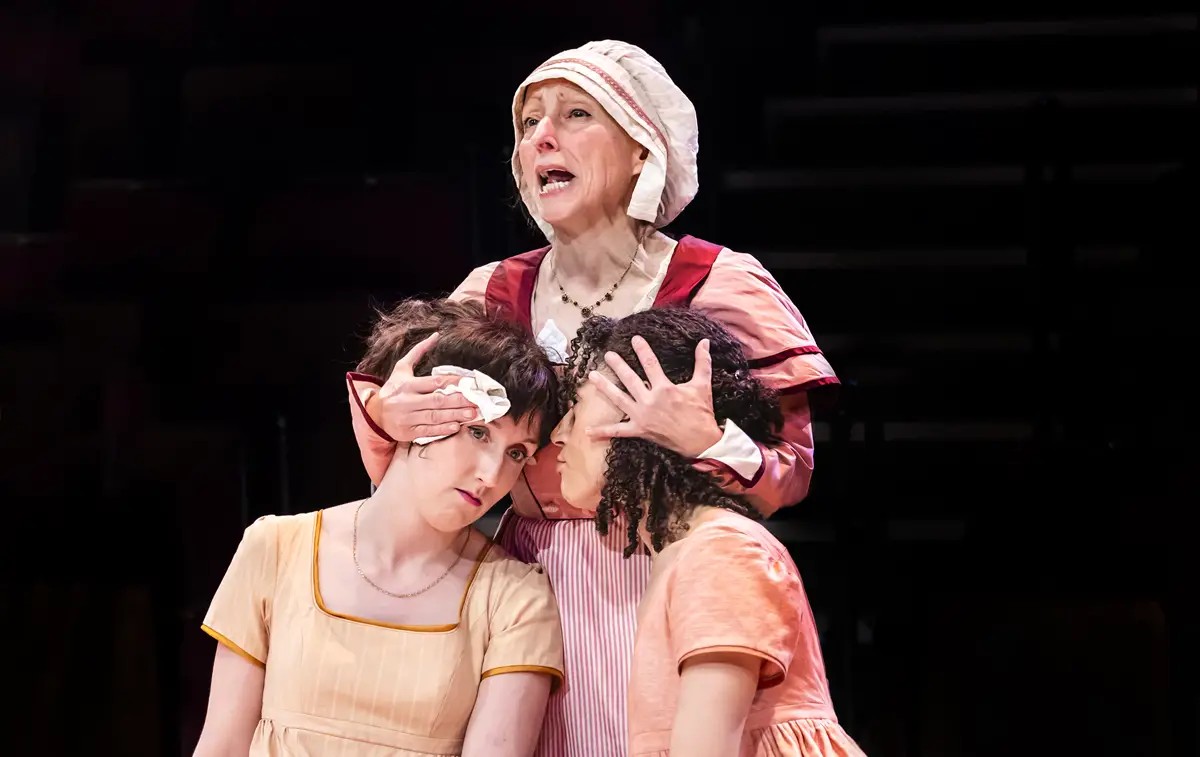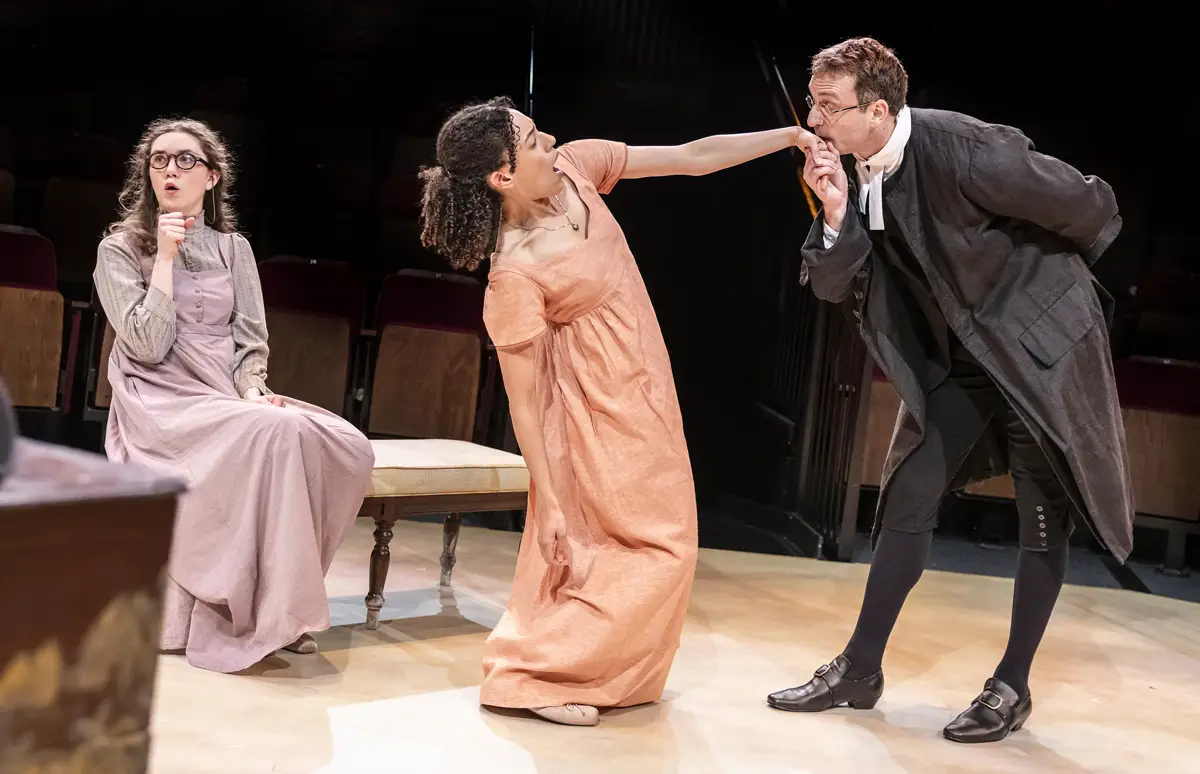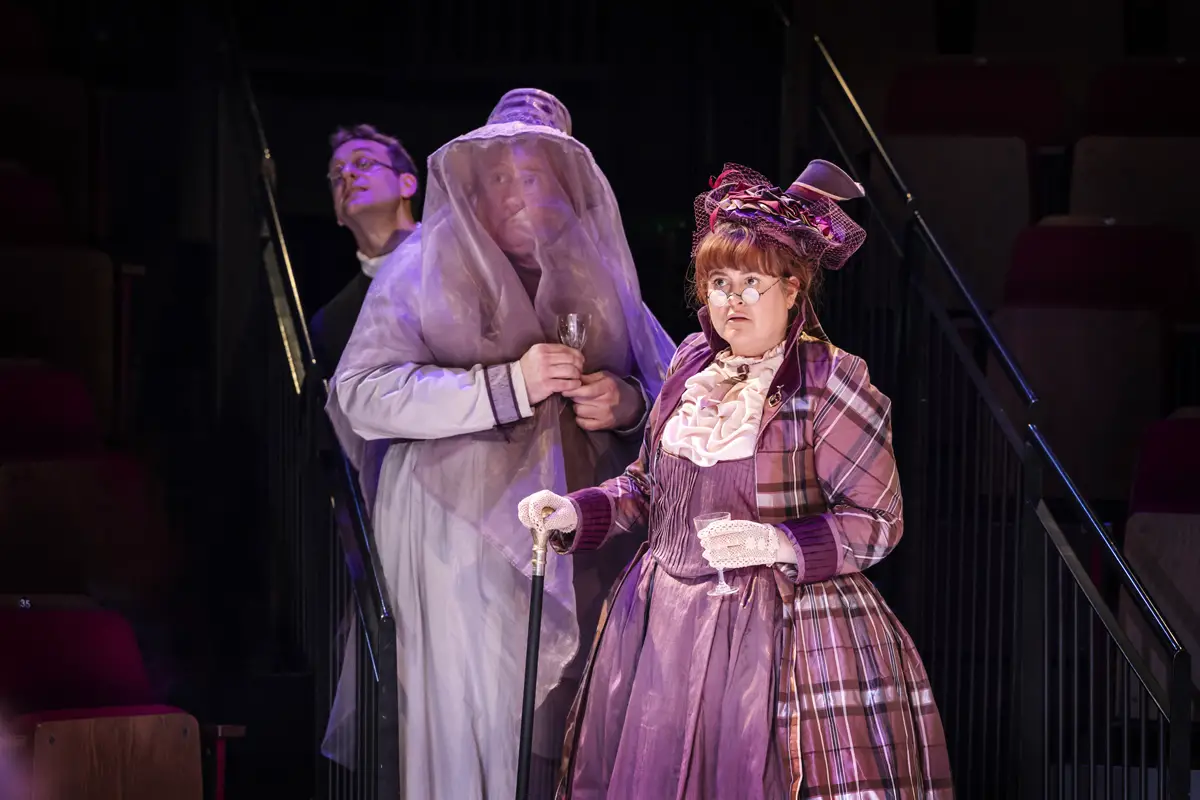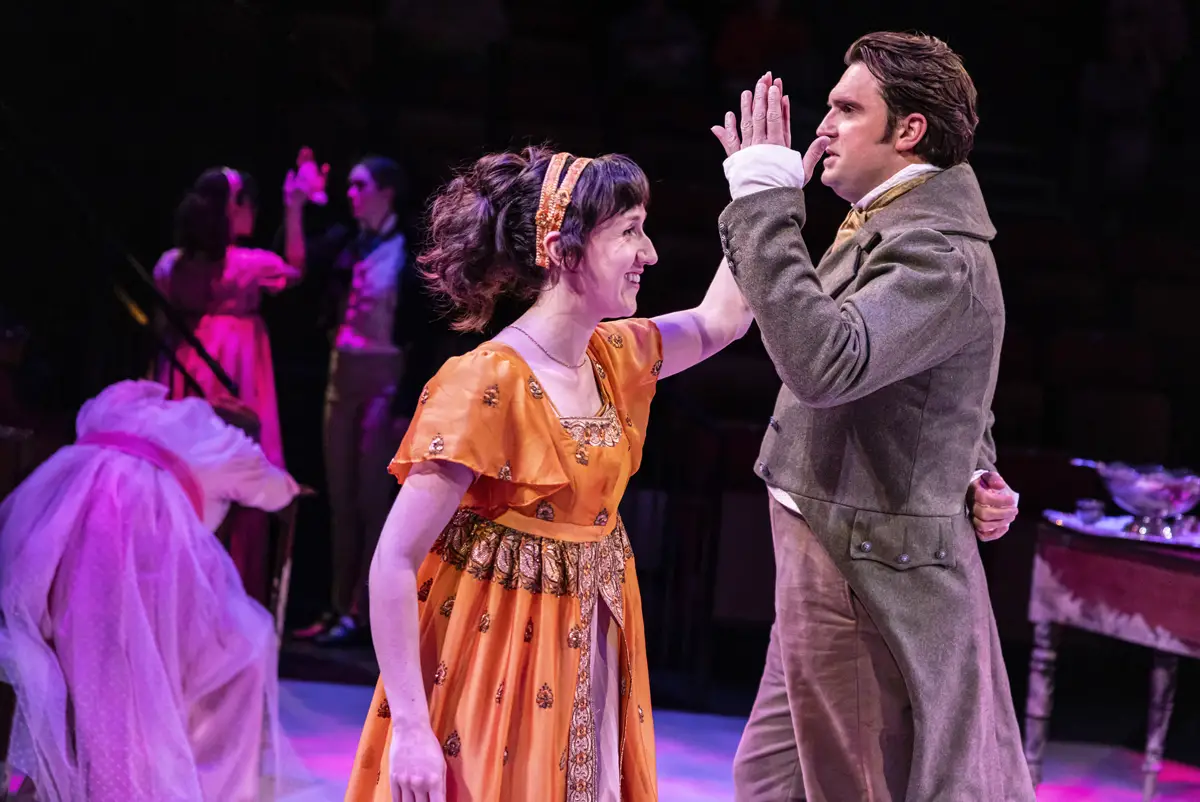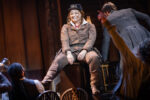Pride and Prejudice – Review – Stephen Joseph Theatre, Scarborough
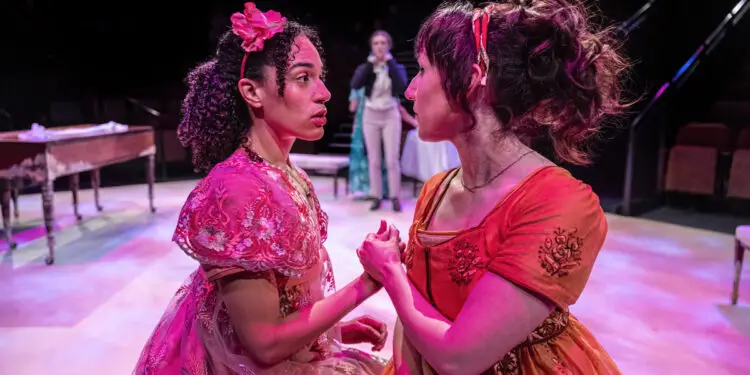
By Elizabeth Stanforth-Sharpe, July 2025
This year marks the 250th anniversary of Jane Austen’s birth, bringing a renewed interest in her writings and life – not only in Bath and the surrounding area, but both nationally and internationally.
This resurgence naturally includes theatres vying for audiences with their own adaptations of her novels, and any production must truly be on its mettle to stand out from the crowd. The formidable collective efforts of Octagon Theatre Bolton, Theatre by the Lake, Stephen Joseph Theatre, Hull Truck Theatre, and Theatre Clwyd have ensured that Kate Hamill’s take on Pride and Prejudice is superbly centre stage – wittily flaunting every ounce of Austen’s irreverent, satirical and facetious viewpoints alongside contemporary references, and stirring the whole with a hilarious romance that bucks societal politeness. One suspects Miss Austen would wholeheartedly approve.
Director Lotte Wakeham, who is also the Artistic Director of the Octagon, has taken full licence to play with Hamill’s script, shaping an impeccably talented cast and creative team into a production that is outrageously farcical and never loses its pace, whilst competently holding on to the essence of Austen’s classic. Northern vowels add an inspired layer of rich sincerity that is never cloying or forced, but genuinely useful in bringing new texture and understanding to the original.
Joanna Holden, whom we last saw at SJT as Vera in Brassed Off, has full opportunity to bring her passion for clowning and comedy to the role of Mrs Bennet. From the moment she opens the show to the musical accompaniment of Beyoncé’s ‘Single Ladies (Put a Ring on It)’, she has our hearts. This is Mrs Bennet as you’ve never seen her before – ambitious for her daughters to marry well and with an endearing fondness for her own husband, but with a touch of Aunt Sally, Hylda Baker and Su Pollard thrown in. She is zany, energetic, caring, rightfully concerned about her daughters’ futures, yet prone to being indelicate, lacking in sense, given to outrageous self-pity – and utterly brilliant in it all.
“High spirits”
Mr Bennet, played by Dyfrig Morris, is as diametrically opposed to his wife’s character as it is possible to be. He likes nothing more than to sit quietly reading his paper without the constant interruptions of a house full of women and has no time for Mrs Bennet’s matchmaking games. Morris gives him a teasing warmth and gentle droll humour that is a perfect foil to the more exaggerated characters.
That is not to say that Morris misses out on the chaotic fun. He also takes on the role of Miss Anne de Bourgh, who lollops on to the stage as the sickly daughter of Lady Catherine – cocooned in a costume styled somewhere between Miss Havisham and one of Bruegel the Elder’s beekeepers – ready to be married to a horrified Darcy.
Hamill prunes the Bennet sisters to a more manageable four, without losing any of the familial mayhem. All are deliciously drawn characters who argue with and love each other in equal measure.
Jane, played tenderly by Aamira Challenger, is a sweet-tempered, shy and modest confidante and loyal friend to Elizabeth. A true believer in romance, she and Charles Bingley are immediately besotted when they meet at a ball, and a friendship begins to blossom.
Lydia is wringing as much wildness and high spirits from her teenage years as she possibly can. Played beguilingly by Jessica Ellis, Lydia loves the gossip, the socialising, the men, and the contents of the ballroom punchbowl – while also casting an embarrassing light on her parents’ failings. Eloping with Mr Wickham is a foolish joke to her, unaware of the deeper repercussions. The character strikes a fine balance between girlish naïvety, comedic irresponsibility, and headstrong resistance to change – all superbly managed by Ellis.
“Social status”
If reviewers are allowed a favourite sister, mine is most definitely Mary, played beautifully by Eve Pereira. Not in the least motivated to play societal games, dance at balls or acquire a husband, Mary spends her time playing the pianoforte and reading books. She has some terrific put-down lines and, when the subject of marriage is raised, laconically bashes out Chopin’s Funeral March. Ever one to bear a grudge, when asked to forgive Lydia’s wrongdoing, she assumes a look of thunder and forces her resentment through gritted teeth: “She locked me in a cupboard” – an event you just know will be remembered for a very long time. Please, someone give Mary a play of her own.
But, of course, the sister who is the real focus of the story is Elizabeth – and there couldn’t be anyone more perfect for the part than Rosa Hesmondhalgh. Pretty, intelligent, honest, quick-witted, but sharp-tongued and with a tendency to make hasty judgements, she is more than capable of rising above the nonsense and impropriety that pervades class expectations. She must negotiate a hopeless mother, a distant father, two badly behaved younger sisters, the insincere courting of a slimeball cleric, several snobbish meddling females, a less-than-gallant soldier, and her own initial prejudices against Darcy – before eventually winning his heart.
Darcy is portrayed by James Sheldon, who is more awkwardly reserved than smouldering – a decision that works well on stage, without detracting from pricelessly amusing scenes. Still proud and intensely conscious of his social status, he almost bungles his relationship with Elizabeth, but when matters do resolve, there are some special moments for the audience to savour.
Ellis also plays at the other end of the age spectrum as Lady Catherine de Bourgh, Darcy’s aunt and Mr Collins’ benefactor. Though she cannot be described as warm, she shows congeniality to those who respect her social status, whilst making it abundantly clear she will not tolerate anyone of inferior rank. She opposes Darcy’s interest in Elizabeth because the Bennet family are not of sufficient pedigree, and regards the ailing Anne a far better match, declaring that the pair have been betrothed since infancy.
Jane’s love interest, Bingley, gives Pereira the opportunity to take on another role. Bingley is kind, charming and wealthy, but easily swayed by Darcy and his sister Caroline (Kiara Nicole Pillai). In keeping with the playfulness and wordplay of Hamill’s piece, the theme of Bingley’s Ball continues with him bouncing a rubber ball across the stage at each entrance.
“Sheer chance”
As in the original, Jane visits Bingley at Netherfield, catches a chill, and is forced to stay – followed by Elizabeth, who gets caught in a downpour. What the original omitted was the musical accompaniment of Travis’ ‘Why Does It Always Rain on Me?’ as Elizabeth becomes ever more bedraggled – a matter thankfully corrected by the ingenious skills of sound designer Andy Graham and Musical Director Sonum Batra.
Upon their return to Longbourn, they discover Mr Bennet’s cousin, the inane sycophant Mr Collins – who will one day inherit the estate – is present, and Mrs Bennet is determined that Elizabeth should marry him. Austen described Mr Collins as “not a sensible man, and the deficiency of nature had been but little assisted by education or society.” Ben Fensome (once creator of the YouTube Budget Pride and Prejudice) is drink-spewingly risible as the ludicrous Mr Collins – imagine, if you will, a morphing of Mr Bean, Ichabod Crane and John Cleese’s Ministry of Silly Walks, with a vague memory of Sunny Jim, the Forces cereal character, thrown in for good measure. Toady and obsequious – but totally absurd.
One line I’m so glad Hamill has retained from Austen’s original comes when Elizabeth turns down Mr Collins’ proposal. Her mother is distraught and says she will never see her again if she refuses. Mr Bennet retorts: “An unhappy alternative is before you, Elizabeth. From this day you must be a stranger to one of your parents. Your mother will never see you again if you do not marry Mr Collins, and I will never see you again if you do.”
Elizabeth’s best friend is Charlotte Lucas, played by Kiara Nicole Pillai. She does not share Elizabeth’s values, pragmatically realising she is not getting any younger and needs the financial security of a husband. Cynically asserting that happiness in marriage is down to sheer chance, she chooses to marry the oily Mr Collins.
Fensome also plays Mr Wickham, the cad who is initially charming, but proves immoral, dishonest and untrustworthy. Wickham’s is a smaller part, but important in establishing a contrast with Darcy – who initially lacks charm but always maintains his integrity.
“Wonderful”
The designer for Pride and Prejudice is Louie Whitemore, who specialises in designing for challenging spaces, and has done a superb job. The set and costumes are briskly adaptive, quickly conveying changes in setting through clever staging and imagination – with a couple of technical surprises mixed in. A tip: watch Mr Collins manoeuvring furniture during scene changes – not part of the principal action, but a whole comedy act in itself. It’s the little details that make live theatre so uniquely precious.
I’ve already mentioned the sound designer and composer. I won’t spoil when each track comes in, but listen out for snippets of The Human League, The La’s, Blur, Sugababes, Beethoven and Wagner. The one leading into the visit to Pemberley is pure genius.
The rest of the creative team also deserve mention: Jamie Platt (Lighting), Jonnie Riordan (Movement), Chantell Walker (Associate Director), Fraser Scott (Assistant Director), Liv Barr (Casting), Alix Dunmore (Accent Coach), and Stage Managers Wesley Carter, Sarah Rhodes-Cannings, and Missy Steinbach. All are vital to shaping a play like this into being.
One more person deserves commendation: Emily Kathryn, the Off Stage Swing for Pride and Prejudice, making her theatre debut. The Off Stage Swing is the performer who learns multiple roles and stands by, ready to step in if a cast member is indisposed. It is a vital role, especially in long runs, and though she wasn’t needed the night I attended, her contribution is valued and should be recognised.
This is the 250th anniversary of Jane Austen’s birth – but it is also the 70th birthday of Stephen Joseph Theatre. There couldn’t be a more wonderful summer production to celebrate with than this effervescent, sparkling show.
‘Pride and Prejudice’ is at Stephen Joseph Theatre until July 26th and at Hull Truck Theatre, September 18th – October 11
